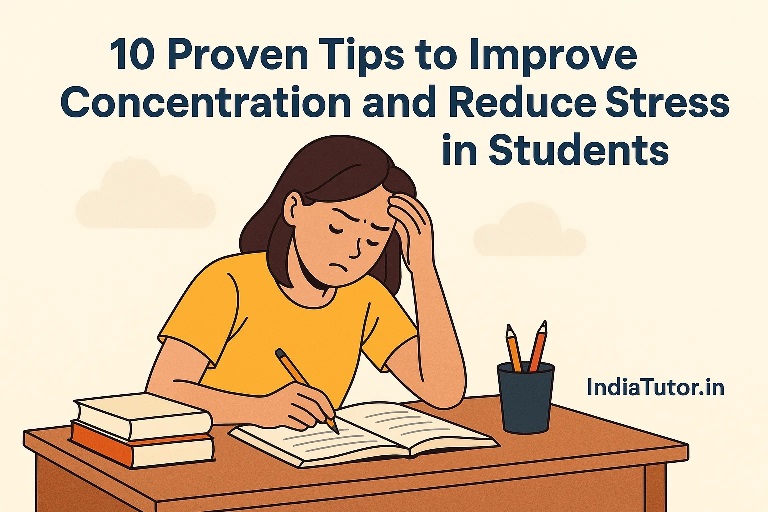Students today face more challenges than ever before. Academic competition, long study hours, constant screen exposure, and the pressure to perform well often lead to rising stress levels and difficulty in maintaining focus. A recent survey by the Indian Journal of Community Medicine found that nearly 30 percent of school students experience moderate to high stress, which directly impacts their ability to concentrate and perform well in studies.
The good news is that concentration and stress management are skills that can be developed with the right guidance and daily practices. Here are 10 proven, practical tips that can help students focus better and keep stress under control.
1. Follow a Structured Routine
Students who follow a fixed routine often find it easier to manage time and stay calm. When study hours, breaks, meals, and sleep times are consistent, the brain adapts and functions more efficiently. A clear routine reduces last-minute stress and helps students know what to expect each day.
2. Break Study Sessions into Smaller Parts
The human brain works best in focused intervals. Studies show that the average attention span of a teenager is around 25 to 30 minutes. Instead of sitting for hours, students should break study sessions into 30–40 minute chunks with 5–10 minute breaks in between. This approach, often called the Pomodoro Technique, keeps the mind fresh and alert.
3. Get Adequate Sleep
Sleep is one of the most underestimated factors in concentration. Research from the American Academy of Pediatrics shows that students who sleep less than 7 hours a night struggle with memory, focus, and emotional balance. A regular 8-hour sleep schedule is essential for reducing stress and improving learning capacity.
4. Limit Screen Time and Social Media
While technology is useful, constant use of phones and social media interrupts concentration and increases stress. A Harvard Medical School study found that students who spent more than 3 hours daily on social media reported higher stress and lower academic performance. Parents and students should set clear boundaries for recreational screen time.
5. Practice Mindfulness and Breathing Exercises
Mindfulness techniques such as deep breathing or short meditation sessions help calm the mind and improve focus. Just 10 minutes of mindful breathing daily has been shown to reduce stress hormones and enhance attention span. Schools across India are gradually introducing mindfulness activities in classrooms with positive results.
6. Stay Physically Active
Physical activity directly impacts mental sharpness. Exercise increases blood flow to the brain, improves memory, and reduces anxiety. Even 20 minutes of walking, cycling, or yoga daily can significantly improve concentration levels in students. Active children also handle exam stress more effectively than those with sedentary lifestyles.
7. Eat a Balanced Diet
Brain function is closely linked to nutrition. Diets high in junk food and sugar can cause energy crashes and lack of focus. Foods rich in protein, omega-3 fatty acids, and vitamins such as nuts, fruits, vegetables, and whole grains help improve memory and concentration. Staying hydrated with enough water is equally important.
8. Create a Distraction-Free Study Space
A cluttered environment often leads to a cluttered mind. Students should have a quiet, well-lit, and organized study area free from distractions like television and mobile notifications. Even small changes, such as keeping only necessary books on the desk, can make a big difference in focus levels.
9. Set Realistic Goals
Unrealistic academic goals are one of the main reasons for student stress. Breaking larger goals into smaller, achievable tasks helps build confidence and reduces anxiety. For example, instead of aiming to complete an entire syllabus in a week, focusing on finishing one chapter a day keeps motivation high and stress low.
10. Seek Support When Needed
Sometimes, despite best efforts, students may struggle with stress and concentration. Talking to parents, teachers, or a counselor can provide emotional support and guidance. According to a study by the National Institute of Mental Health and Neurosciences, students who receive timely emotional support are far more resilient in handling exam stress and academic challenges.
My Thoughts
Improving concentration and managing stress are essential for every student’s academic success and overall well-being. By adopting healthy routines, practicing mindfulness, staying physically active, and seeking timely help, students can overcome challenges and perform to their full potential.
At IndiaTutor.in, we believe that education is not just about learning subjects but also about developing the life skills needed to thrive in today’s world. With the right support, every student can learn to focus better, handle stress, and achieve success in academics and beyond.
By Nidhi Mehta, Founder – IndiaTutor.in
🔥 Post Engagement
👁️ 13 Total Views
🔥 3 Views Today
📈 13 Views Last 7 Days
Share:
WhatsApp | Facebook | Twitter | LinkedIn
To share your Feedback or Review – Contact Us
Are you a Tutor? Register your Tutor profile on India Tutor to connect with Students in India and Abroad.
Are you a Parent or Student? – Submit Tutor Wanted Form to reach relevant tutors registered on IndiaTutor.in.
Do you own a Tuition Center? Want to connect with students in your local area? List your center with us.
Free Online Self Evaluation Tests for Tutors and Students
Read our Reviews Have Questions? Read FAQs

